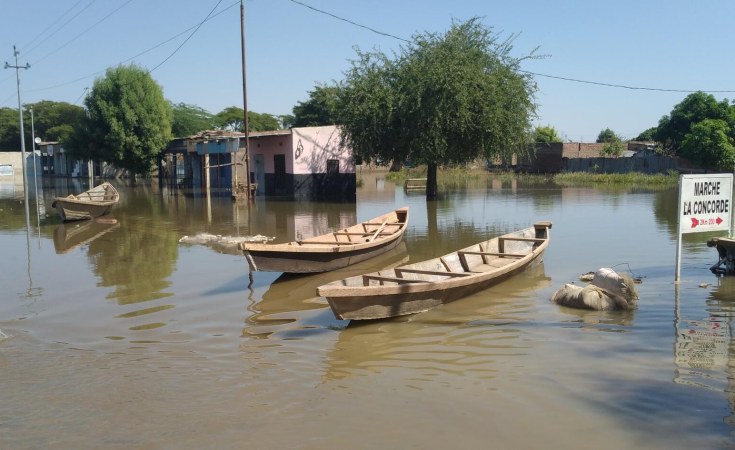An Intergovernmental Panel on Climate Change (IPCC) report issued today, which warns that global warming this century is on course to exceed an agreed 1.5°C limit without drastic and immediate cuts in greenhouse gas emissions, must accelerate the phasing out of fossil fuels, Amnesty International said.
"This science-based IPCC assessment makes clear that without transformational changes now in our approach to tackling climate change the 1.5°C warming limit will be missed by a wide margin, with catastrophic consequences for people around the world," said Amnesty International's Climate Advisor Chiara Liguori.
"Without immediate concerted action it is no longer possible to limit the global rise to 1.5°C this century. We must step away from the path we are currently on towards an almost 3°C increase. The effects of inaction are already clear in the form of more extreme weather events that often hit hardest those who have been the least responsible for the mass consumption of fossil fuels that caused this crisis.
Without transformational changes now in our approach to tackling climate change the 1.5°C warming limit will be missed by a wide margin, with catastrophic consequences for people around the world.Amnesty International's Climate Advisor Chiara Liguori
"More severe droughts, catastrophic flooding, increasingly intense storms and rising sea levels are killing thousands every year and forcing many more people to move from their homes. So far this year heat records have been broken in South America, where forest fires are currently raging, and the Indian government has convened a disaster management meeting after the hottest recorded February since 1901. The IPCC report estimates up to 3.6 billion people worldwide are climate vulnerable.
"The consequences of global warming for ecosystems and biodiversity, which are also essential for human health and wellbeing, are equally clear. The devastation of sea corals is already happening as oceans warm, putting the well-being of the hundreds of millions of people who rely on fishing in jeopardy. Half of all species worldwide are being forced to migrate and extinctions are rapidly accelerating.
"There can be no more excuses. States must adopt, in genuine consultation with all affected stakeholders, immediate policy and legislative changes to rapidly phase out fossil fuels and carry out an urgent and just energy transition which respects human rights and protects communities currently reliant on fossil fuel-based economies, Indigenous Peoples and others."
There can be no more excuses. States must adopt, in genuine consultation with all affected stakeholders, immediate policy and legislative changes to rapidly phase out fossil fuels.Chiara Liguori
Amnesty International is supporting widespread calls for a legally binding Fossil Fuel Non-Proliferation Treaty and urges governments to also agree to rapidly phase out the use and production of all fossil fuels at the COP28 climate talks later this year.
Chiara Liguori said: "Technologies to capture and store carbon, or to remove it from the atmosphere, are not the answer to reduce greenhouse gas emissions. Most are either ineffective or unproven but for the fossil fuel companies which continue polluting the planet they are a useful distraction that allows them to pretend a climate fix is at hand."
"Real change is possible. There have been significant breakthroughs in renewable energy that can hugely reduce the global reliance on fossil fuels. Recognition that better energy efficiency and developing public transit are key will put us on a more sustainable path. The investment potential is available to build entire energy systems based completely on renewables by 2050.
Real change is possible. There have been significant breakthroughs in renewable energy that can hugely reduce the global reliance on fossil fuels.Chiara Liguori
"However, these advances will be potentially meaningless in mitigating damage to the climate system unless the worldwide production and use of fossil fuels is drastically curbed. Wealthy states must also significantly increase their funding to support lower-income countries to expand renewable energy and put in place adaptation measures to cope with climate change while adequately compensating people for the loss and damage they are facing."
Background
The IPCC, comprised of 195 member states, is the leading international body and established to provide an objective scientific basis for analyzing climate change's impacts on natural and human systems. The Synthesis Report, published today and released in Interlaken in Switzerland, brings together evidence from multiple studies it has conducted since 2018, and is the first of its type since 2014.
The report is widely considered essential to informing governments and policy makers about the current and future state of the global climate and the actions needed to tackle the climate crisis.
It forecasts the 1.5°C limit might be breached before 2035. It says greenhouse gas emissions must be cut by almost half by 2030 to come in at or below the 1.5°C limit, with further reductions to follow. However, according to the International Energy Agency, annual oil and gas output globally is expected to increase by 2030.
The IPCC unequivocally states that greenhouse gases, produced primarily by using fossil fuels, are causing unprecedented levels of global warming, and that the last decade was the warmest in the previous 125,000 years. This have already caused "substantial damages, and increasingly irreversible losses" to nature and people.
It also recognized the differential impacts of climate change caused by historical and ongoing patterns of inequity such as colonialism, especially for many Indigenous Peoples and marginalized communities. The IPCC has also highlighted how prioritizing equity, climate justice, social justice, inclusion and just transition processes can accelerate emission reduction efforts and lead to climate resilient development.


